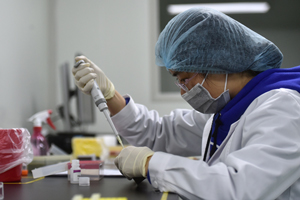Experts warn of potential concerns about genetic privacy

However, industry analysts said the personal genetic-testing sector is thriving, especially at nonmedical facilities.
Genetic testing uses a number of techniques, such as analysis of human DNA and a variant called RNA, and proteins, they said.
Zhao Ping, director-general of the Cancer Foundation of China, said medical treatment cannot be given purely on the results of genetic tests, and carrying certain faulty genes doesn't necessarily result in related medical conditions, because factors such as environment and lifestyle also play major roles.
Personal testing
In recent years, personal genetic-testing kits have become widely available in China via e-commerce platforms and offline facilities that specialize in health checks.
The tests, which cost several hundred to tens of thousands of yuan and are usually conducted via oral swabs or blood taken from the finger, have a number of uses. They range from predicting the risk of developing conditions such as cancer, diabetes, hypertension and Alzheimer's disease, to assessments of an individual's potential talents, or even a person's ability to consume alcohol.
Liang You, a 27-year-old mother in Beijing, has just placed an online order for a genetic-testing kit which the manufacturers claim can identify her 3-year-old son's potential talents, such as intellectual, sporting or musical ability.
The kit, which cost 1,988 yuan ($288), claims to test for 19 separate indicators, such as memory and attention span, plus linguistic, creative and athletic abilities.
"The kit is affordable, and oral swabs are not dangerous. The results could help me choose the right extracurricular programs for my son," Liang said.
However, Zhao, from the cancer foundation, said the kits are more about fun than science: "These personal testing products are largely unregulated, so we see a wide range of them offered via the internet."
Earlier this month, the US Food and Drug Administration allowed marketing of the country's first direct-to-customer genetic tests, which assess the risks of contracting 10medical conditions, according to an FDA statement.



















